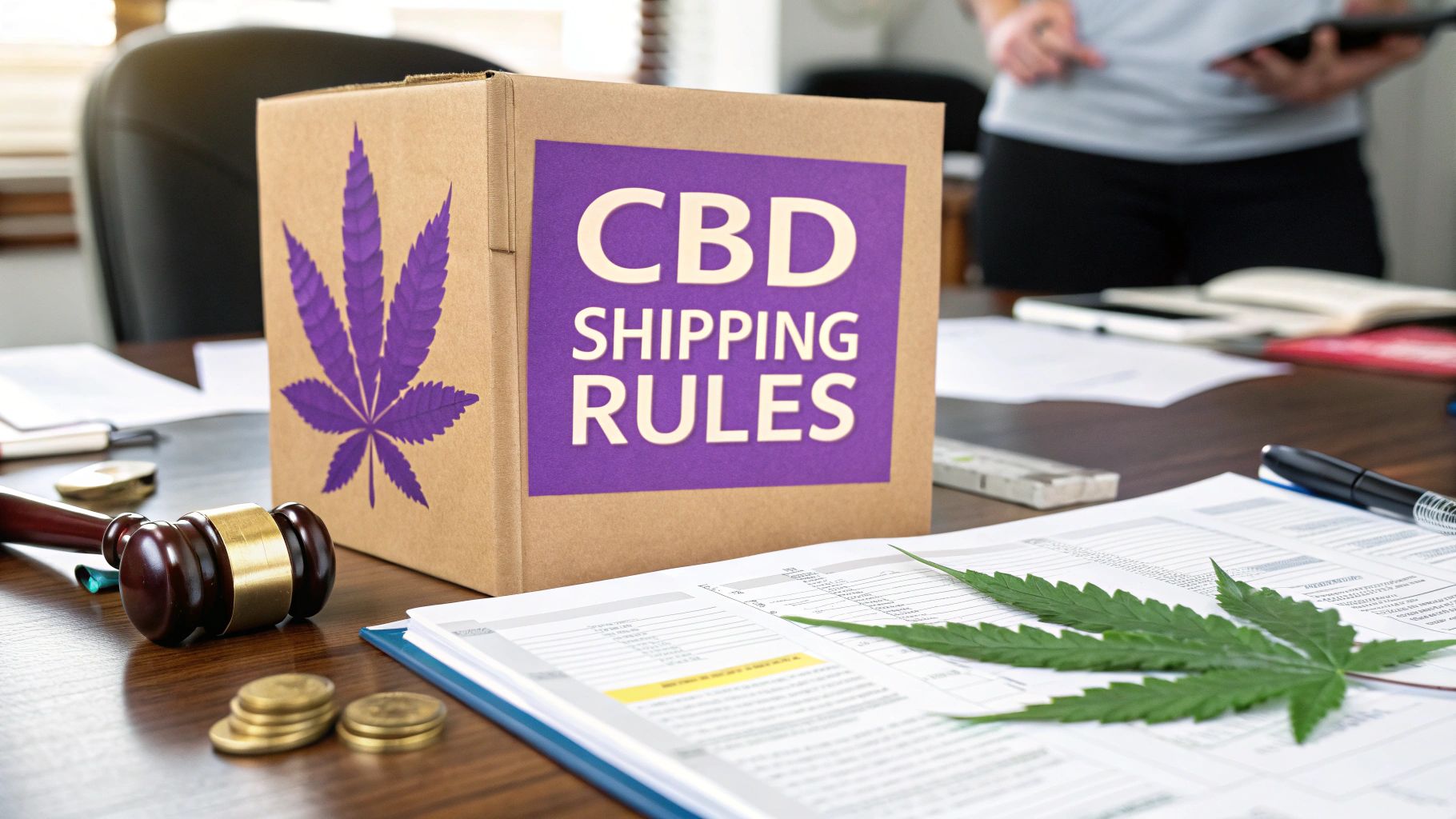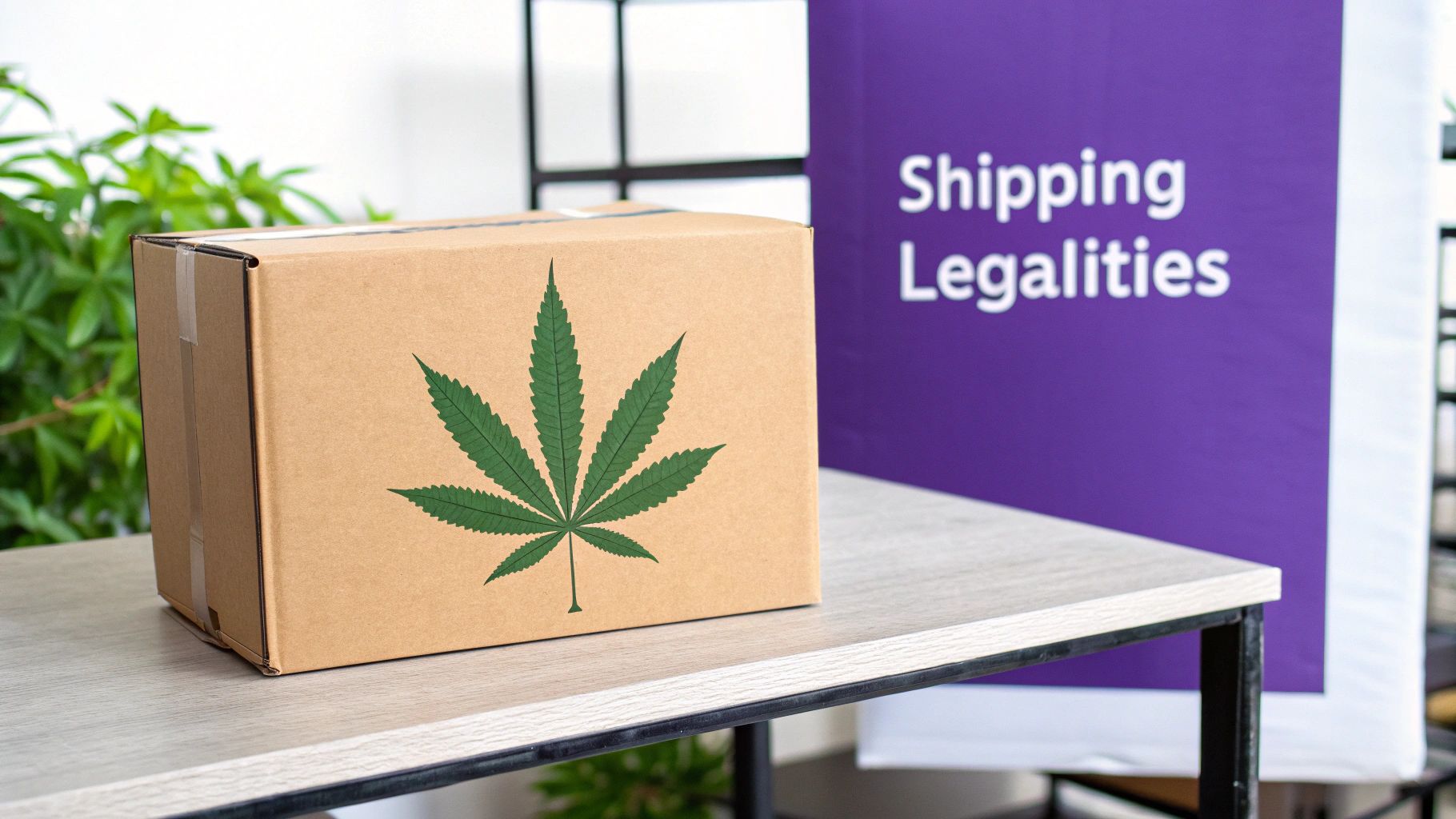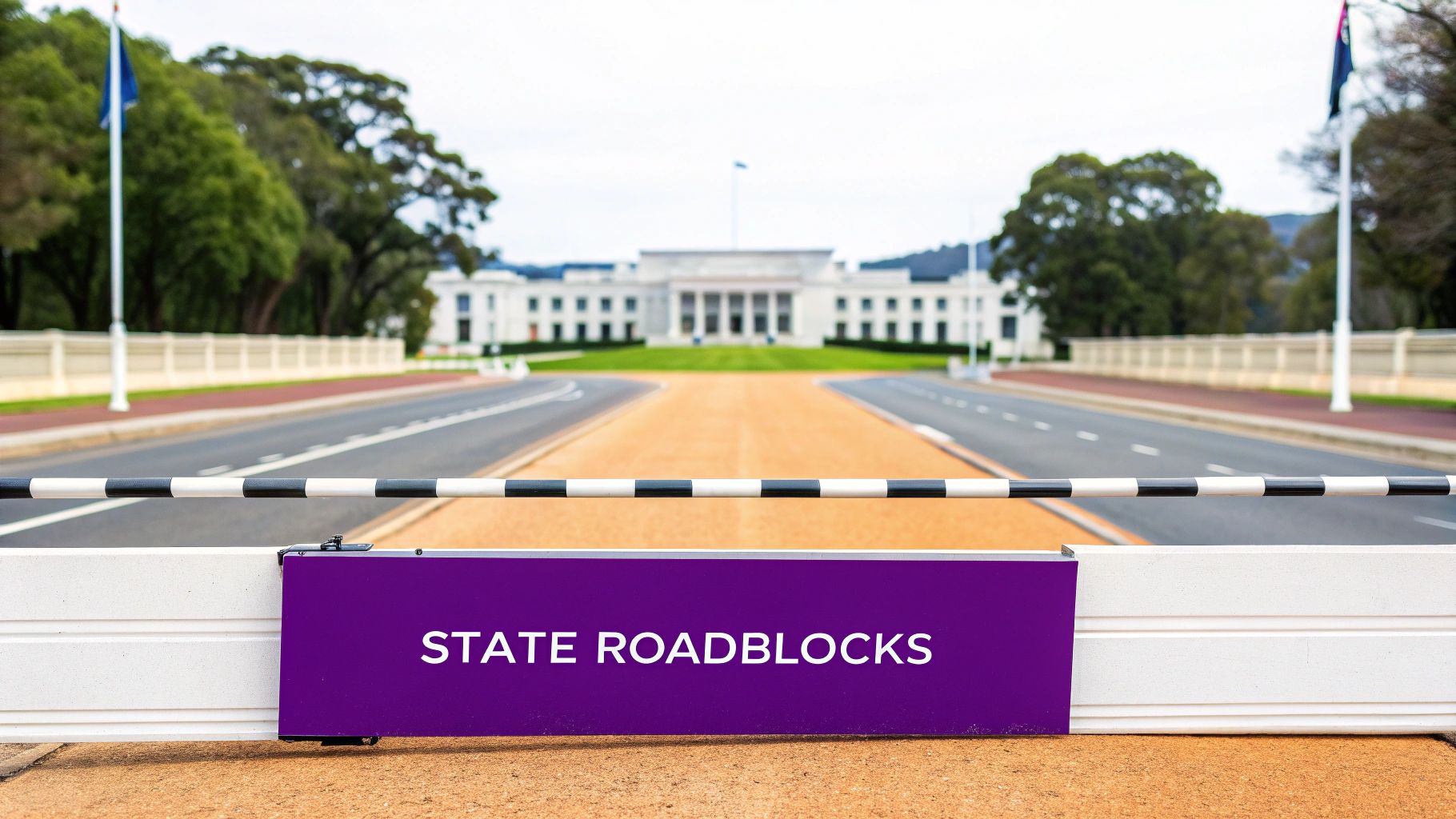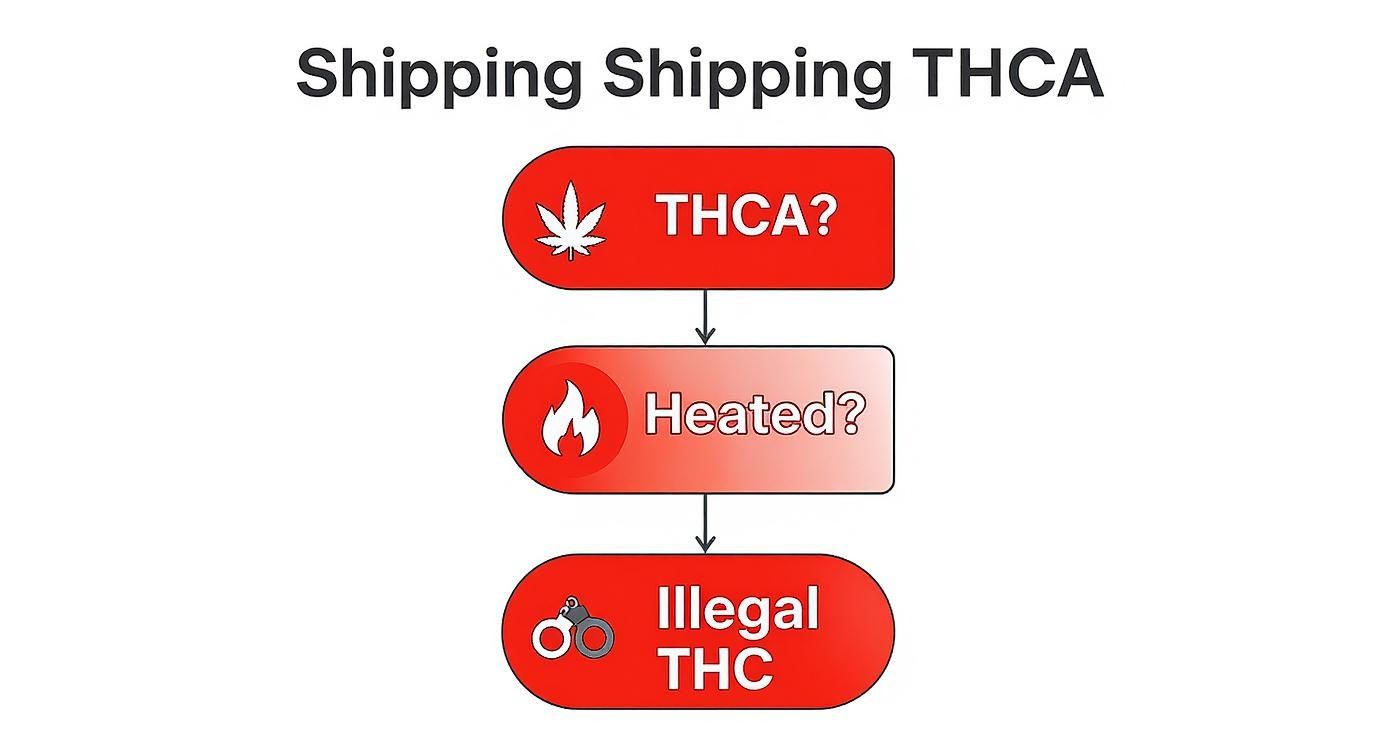
CBD/Hemp/THCA Shipping Laws Washington: Your Essential Guide
CBD/Hemp/THCA Shipping Laws Washington explained: navigate state vs. federal rules and practical steps to stay compliant.
Cody Y.
Updated on Oct 22, 2025
Trying to ship CBD, hemp, or THCA products directly to a customer in Washington? You might want to hit the brakes. While federal law gives a green light to hemp-derived products, Washington state throws up a big red stop sign, creating a legal maze for businesses and consumers alike.
The heart of the problem is that Washington requires any product with even a detectable amount of THC to be sold exclusively through its state-licensed cannabis system. This effectively slams the door on direct-to-consumer shipments for many of the most popular products on the market.
Navigating Washington’s Complex Cannabis Shipping Rules

To really get a grip on the shipping laws in Washington, you have to understand a fundamental clash between federal permissions and tight state-level controls. The 2018 Farm Bill was a landmark piece of legislation that legalized hemp and opened up interstate commerce for hemp products. But—and this is a big but—it also gave each state the power to write its own, more restrictive rules.
Washington is a prime example of a state that has taken that authority and run with it.
We're going to break down this complex legal landscape piece by piece. You'll see exactly why a product that’s perfectly legal to ship across most of the country suddenly becomes contraband when it's addressed to a home in Washington. This isn't just a minor technicality; it’s a major policy difference that trips up businesses and frustrates customers every day.
The Federal Standard vs. Washington’s Reality
At the federal level, the line between legal hemp and illegal marijuana is crystal clear. It all comes down to a single number.
Hemp is legally defined as the plant Cannabis sativa L. with a THC concentration of no more than 0.3% on a dry weight basis. Anything above that threshold is considered marijuana. Because of this, the U.S. Postal Service and major couriers like UPS and FedEx will carry hemp-derived CBD products nationwide, as long as they meet this federal standard. You can find more details in Washington's official hemp guidelines.
But Washington State doesn’t see it that way. The Washington State Liquor and Cannabis Board (LCB) has its own set of rules, and they are far more stringent.
The LCB enforces a "total THC" standard, which means that if a product contains any detectable amount of THC, it must be sold through the state-licensed cannabis system. This rule effectively blocks direct shipments of popular products like full-spectrum CBD and all THCA flower to consumers.
This guide will also unpack the roles of both the LCB and the Washington State Department of Agriculture (WSDA). Their overlapping jurisdictions create a uniquely challenging environment for anyone trying to get these products into the state.
To make things clearer, here's a quick summary of what's generally allowed and what isn't when shipping directly to consumers in Washington.
Washington Cannabinoid Shipping Legality at a Glance
This table breaks down the legality of shipping different types of cannabinoid products to consumers in Washington State.
| Product Type | Federal Legality (0.3% THC) | Washington State Shipping Legality (to consumers) | Key Restriction |
|---|---|---|---|
| Hemp-Derived CBD Isolate | Legal | Legal | Must contain 0.0% THC (non-detectable) |
| Broad-Spectrum CBD | Legal | Likely Illegal | Prohibited if it contains any detectable THC |
| Full-Spectrum CBD | Legal | Illegal | Contains detectable THC, must be sold via LCB |
| THCA Flower & Products | Legally Gray | Illegal | Contains detectable THC, must be sold via LCB |
| Hemp Food/Fiber Products | Legal | Legal | Must comply with WSDA and federal rules |
As you can see, the "any detectable THC" rule is the main barrier. Products that are federally compliant often run afoul of Washington's strict state-level regulations, making direct-to-consumer shipping a risky proposition.
Understanding the Federal Green Light: The 2018 Farm Bill
<iframe width="100%" style="aspect-ratio: 16 / 9;" src="https://www.youtube.com/embed/q2pghvn2i4g" frameborder="0" allow="autoplay; encrypted-media" allowfullscreen></iframe>To get a handle on Washington's specific rules, we have to start with the big picture at the national level. The 2018 Farm Bill was a game-changing piece of federal legislation that finally drew a clear line in the sand between hemp and marijuana, effectively making hemp legal nationwide.
Think of the Farm Bill as the federal government building a brand-new interstate highway system. It gave a green light for hemp and all its derivatives—including CBD and THCA—to be legally shipped across state lines, as long as they contain less than 0.3% delta-9 THC by dry weight. This one detail is what allows carriers like the U.S. Postal Service to legally transport these products in the first place.
This federal action opened the floodgates for a booming industry and made hemp-derived products widely available. But the bill came with one massive catch that directly shapes the CBD, hemp, and THCA shipping laws Washington enforces today.
States Can Create Their Own Rules
While the Farm Bill built the national highway, it also gave each state the power to set its own local traffic laws. States can either stick with the federal 0.3% THC standard or they can slam on the brakes with much stricter regulations. This is exactly where Washington's approach takes a sharp turn.
The federal government may have paved the way for interstate hemp shipments, but Washington state gets the final say on what can actually be sold and delivered to consumers inside its borders. This state-level authority is the root of all the shipping complexities.
Washington uses this power to put up roadblocks for products that are otherwise perfectly legal on a federal level. Before you even think about shipping to the state, it's critical to understand the critical shipping law differences between federally defined hemp vs marijuana products.
The next section will break down exactly how Washington’s specific laws create these unique restrictions, especially for any product with detectable THC.
Why Washington Puts Up Legal Roadblocks

While the federal 2018 Farm Bill seemed to open a national highway for hemp commerce, Washington state decided to build its own off-ramp—complete with some pretty strict local tolls. This move creates a major split from federal guidelines and slams the brakes on many shipments that are perfectly legal elsewhere in the country.
So, what’s behind this? In a word: safety. State regulators, led by the Liquor and Cannabis Board (LCB), operate on a simple but powerful premise. If a product contains any detectable THC, it's treated as potentially intoxicating. This one idea is the engine driving the state's entire policy.
The Total THC Mandate
The biggest roadblock you'll encounter is Washington's enforcement of a "total THC" standard. This is where things get tricky. Federal law really only cares about the delta-9 THC concentration in a product. Washington, on the other hand, looks at all forms of THC combined.
This means that even federally compliant full-spectrum CBD oils—products that many people use daily across the U.S.—are considered controlled substances here. Because they contain trace amounts of various THC cannabinoids, they can't be shipped directly to consumers. Instead, they’re forced into the state’s highly regulated cannabis retail system.
Washington’s stance is crystal clear: if a product could potentially cause impairment, it belongs inside the licensed cannabis framework. Its hemp origin doesn't matter.
This strict interpretation is all about preventing intoxicating products from slipping into an unregulated market. The state wants to ensure anything with THC is subject to official testing, labeling, and age-verification requirements.
Recent Legislative Tightening
Washington’s laws were already some of the tightest in the nation, but legislative changes in 2023 cinched the belt even further. The state now requires that all products containing any detectable THC—whether it comes from hemp or marijuana—must be sold exclusively through licensed cannabis retailers.
This policy effectively blocks most non-licensed hemp products from being sold in general retail stores or shipped into the state by out-of-state sellers. You can dig deeper into how these restrictions impact the local market and see the real-world effects.
For online retailers and businesses trying to serve Washington customers, this creates an incredibly challenging environment. It makes a rock-solid understanding of the CBD, hemp, and THCA shipping laws in Washington not just helpful, but absolutely essential for staying compliant.
The Big Problem with Shipping THCA to Washington
Tetrahydrocannabinolic acid, better known as THCA, is probably the biggest legal gray area in the national hemp market right now. But when it comes to Washington state, there's absolutely no gray area—only a hard red line. If you're shipping cannabis products to the Evergreen State, you need to understand this compound to stay out of serious trouble.
So, what is THCA? Think of it as the raw, non-intoxicating version of THC that's found naturally in the cannabis plant. By itself, THCA won’t get you high. The magic (and the legal problem) happens when you add heat. Smoking, vaping, or cooking triggers a chemical reaction called decarboxylation, which converts that dormant THCA into intoxicating delta-9 THC.
Washington’s Stance: Potential Is Reality
This potential for conversion is exactly why Washington regulators are so strict. While federal law tends to focus on the final delta-9 THC percentage in a product, Washington's approach is much more cautious. The state simply doesn't distinguish between THCA and THC because one so easily becomes the other.
As a result, any product containing THCA is classified as marijuana under state law, period. This means shipping THCA flower, vapes, or edibles directly to a customer in Washington is illegal. These products are confined to the state's licensed dispensary system, just like traditional high-THC cannabis.
Trying to get around these rules is a high-stakes gamble. For online sellers and their customers, shipping THCA to a Washington address comes with significant legal risks, including seized packages, fines, and even potential criminal charges.
The bottom line is simple: Washington law ignores the legal distinction that many online retailers depend on. When it comes to the CBD/Hemp/THCA shipping laws Washington enforces, if a product can become THC, it’s treated as THC from the get-go. That makes any direct-to-consumer shipments strictly prohibited and a very bad idea.
A Practical Compliance Checklist For Shipping
Trying to ship hemp products into Washington is like navigating a minefield. The state’s laws are so restrictive that even federally legal products can land you in serious trouble. You have to be precise and understand exactly what's allowed.
For businesses, there's really only one surefire way to ship legally: stick to products that are genuinely THC-free. This isn't about the federal 0.3% THC standard. When it comes to direct-to-consumer shipping in Washington, the legal threshold is basically zero.
For Businesses Shipping To Washington
To stay out of hot water, you absolutely have to treat Washington as a special case. Before a single package goes out the door, run through this checklist.
First, you need a third-party COA. A recent Certificate of Analysis isn't just a good idea; it's non-negotiable. It must clearly state "non-detectable" or "ND" for all THC compounds.
Next, double-check your labeling. Your product labels need to be spot-on, matching the COA and clearly stating it's a THC-free product.
Finally, keep your hemp origin documentation in order. You need records proving your products come from legally grown hemp. For more details on this, check out our guide on general hemp shipping rules and restrictions.
The infographic below really drives home why THCA is a complete non-starter for shipping into the state.

Because THCA converts directly to illegal Delta-9 THC when heated, state regulators don't make a distinction. To them, it's an illegal substance from the get-go.
Shipping Compliance Checklist for Washington State
Here’s a simple checklist to help you stay compliant. Go through these steps for every shipment destined for Washington to ensure you’ve covered all your bases.
| Compliance Step | Description | Status (Yes/No) |
|---|---|---|
| Verify Product is THC-Free | Confirm the product contains non-detectable levels of all THC isomers, not just Delta-9 THC. | |
| Secure a Valid COA | Obtain a recent, third-party Certificate of Analysis showing "ND" for all THC compounds. | |
| Check Product Labeling | Ensure the label accurately reflects the COA and clearly indicates the product is THC-free. | |
| Confirm No THCA | Verify the product contains no THCA, as it's treated as a controlled substance in Washington. | |
| Maintain Hemp Source Records | Keep documentation proving the product is derived from legally cultivated hemp under the 2018 Farm Bill. |
Using this checklist can help systematize your shipping process and reduce the risk of costly compliance mistakes. It's a small step that provides a huge layer of protection.
Advice For Washington Consumers
If you live in Washington, you need to be just as careful. Spotting illegal products online is critical to staying out of trouble, so always try to buy from trusted, state-licensed sources.
The state’s own hemp program, approved in 2020, has been a rollercoaster. Licenses dropped to just 33 for the 2023 season thanks to a volatile market. This chaos just underscores why the rules are so strict. When you’re buying, always demand to see a COA first.
Common Questions on Washington Shipping Laws
Trying to navigate the maze of Washington's CBD, hemp, and THCA shipping laws can feel like a headache waiting to happen. Even when you understand the state's strict "total THC" rule, a lot of practical, real-world questions pop up. We'll tackle the most common ones here with straightforward answers to help you stay compliant.
Let’s break down what these regulations mean for everyday situations, from ordering a popular CBD product to the risks of buying from an out-of-state website.
Can I Legally Receive Full-Spectrum CBD Oil by Mail in Washington?
The short answer is a hard no. By definition, full-spectrum CBD oil contains trace amounts of THC. While that’s usually well under the federal 0.3% limit, Washington’s law is much, much tighter.
The state mandates that any product with a detectable amount of THC must be sold exclusively through its licensed cannabis dispensaries. That means shipping a federally legal full-spectrum CBD oil straight to a customer’s door is a violation of state law. The fact that it comes from hemp doesn't create a loophole; if THC is present, it's restricted.
What Happens If I Ship THCA to a Washington Address?
Don't do it. Shipping THCA to Washington is a huge gamble for both the sender and the recipient. Since THCA converts into intoxicating THC when you heat it, state regulators don't see a difference—they treat it as a marijuana product from the get-go.
This classification makes it illegal to ship or sell outside the state-licensed system. If you try to mail a THCA product into Washington, you’re looking at serious consequences:
- Package Seizure: Law enforcement can—and likely will—confiscate the package as illegal contraband.
- Legal Trouble: Both the seller and the buyer could face fines or even criminal charges for illegally shipping and possessing a controlled substance.
- Lost Money: The customer is out the cash they spent, with zero chance of getting it back.
At the end of the day, state authorities see no legal distinction between THCA flower and regular THC flower. Any direct shipment is a serious legal breach.
The main takeaway here is simple: Washington's laws care more about a product's potential to get you high than its technical status under federal hemp laws. If it can produce an intoxicating effect, it's restricted.
Is It Safe to Ship THC-Free Products?
Shipping products labeled "THC-Free" is a much safer bet, but you still have to do your homework. To be fully compliant in Washington, a product can't just be low in THC—it must have zero detectable THC.
Your proof is the Certificate of Analysis (COA). This third-party lab report is the only way to verify a product's contents and stay on the right side of the law.
When you check the COA, look for terms like "Non-Detectable," "ND," or "0.0%" for all THC compounds, including Delta-9, Delta-8, and THCA. Without that clear confirmation, you risk accidentally shipping an illegal product, no matter what the marketing says. Our complete 2025 compliance guide on CBD shipping laws by state digs deeper into why COAs are so critical for nationwide compliance.
Why Do Some Retailers Still Ship to Washington?
It’s a fair question. You’ve probably seen out-of-state online shops perfectly willing to ship full-spectrum CBD or THCA products to a Washington address. So, what gives?
Usually, it comes down to ignorance or indifference. Many of these businesses operate based on the federal Farm Bill and are either unaware of Washington’s uniquely strict laws or simply choose to ignore them. This creates a dangerous compliance gap. The retailer might take the order and the payment, but the package becomes illegal the second it crosses into Washington. The legal risk falls squarely on both the business and the customer, who often has no idea they're breaking state law.
Manually tracking these complex rules is a huge operational burden. Ship Restrict automates compliance by letting you set granular shipping rules based on state, county, or even ZIP code. You can ensure you never make a costly shipping mistake again. Learn how Ship Restrict can protect your business and streamline your operations.

Cody Yurk
Founder and Lead Developer of ShipRestrict, helping e-commerce businesses navigate complex shipping regulations for regulated products. Ecommerce store owner turned developer.